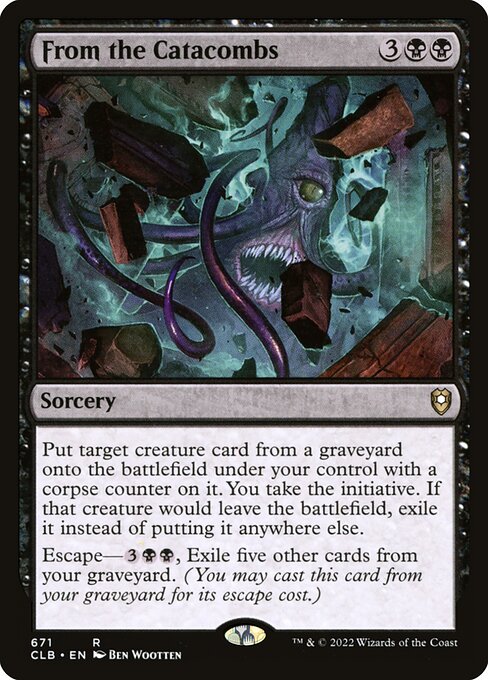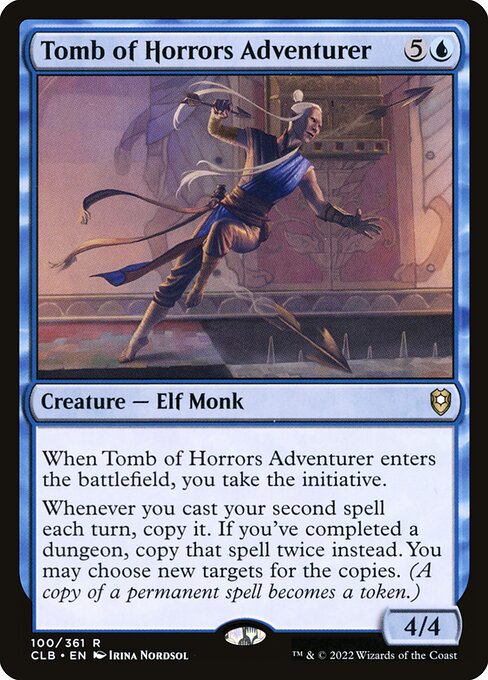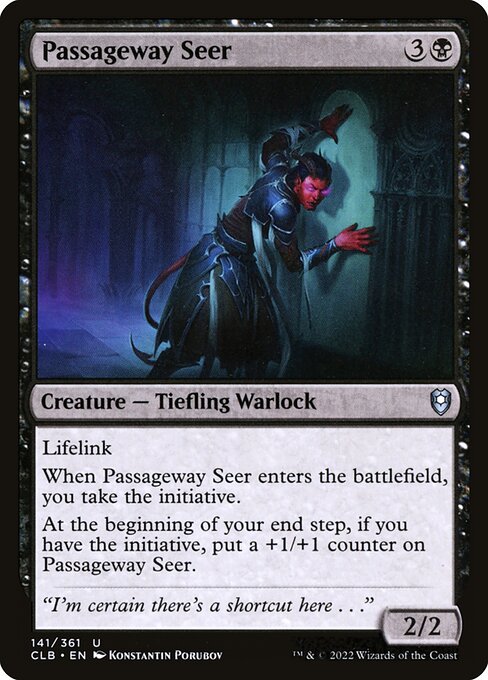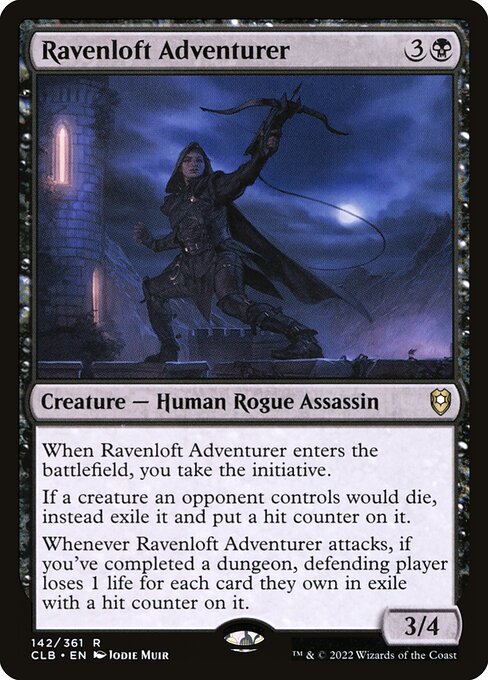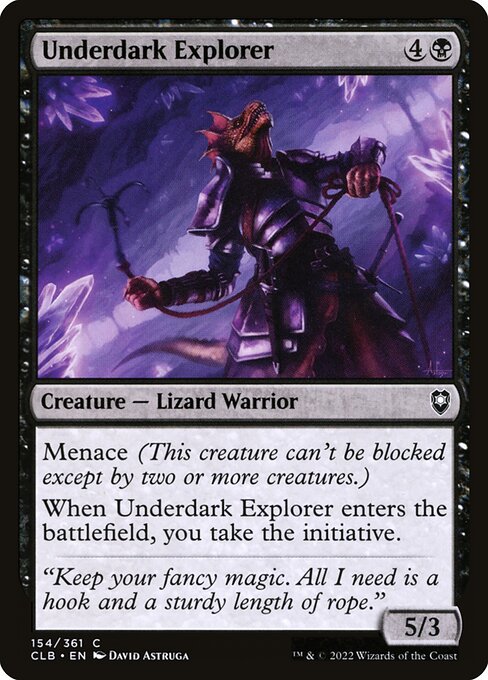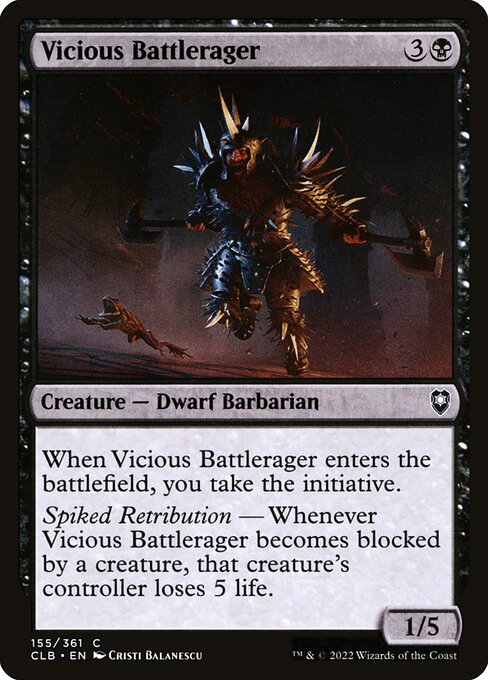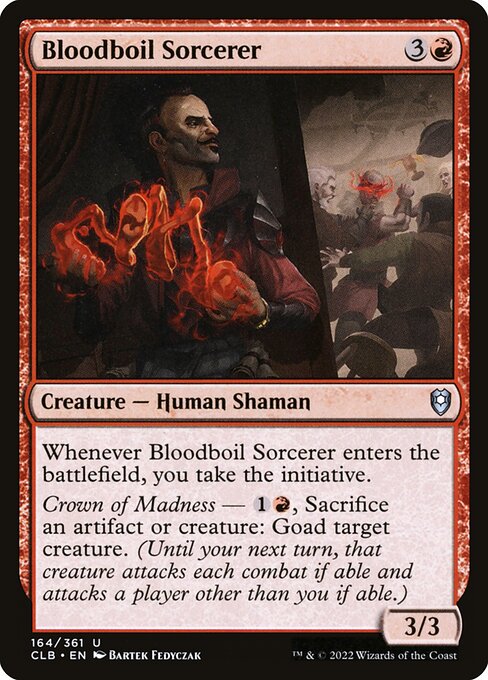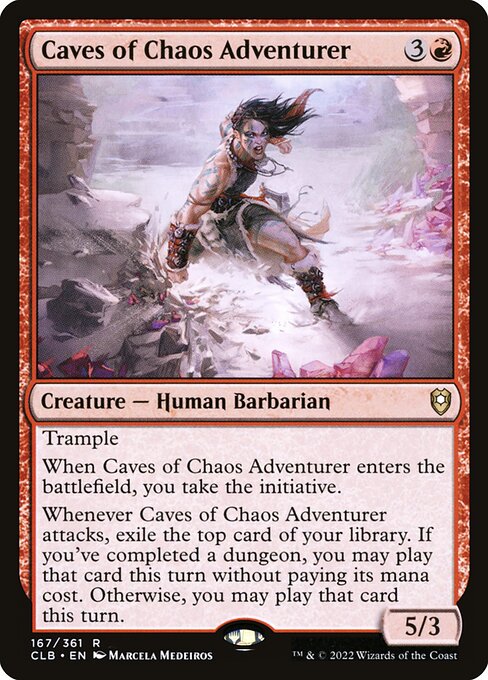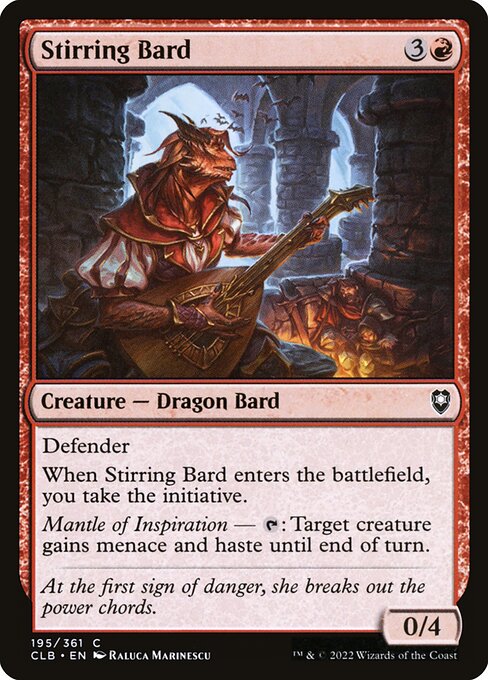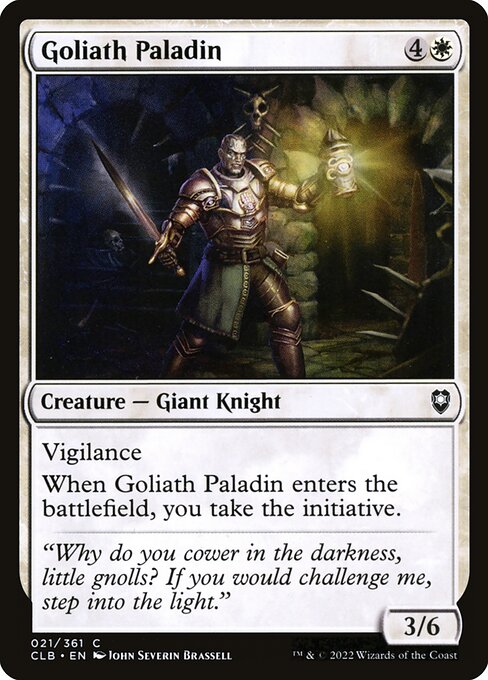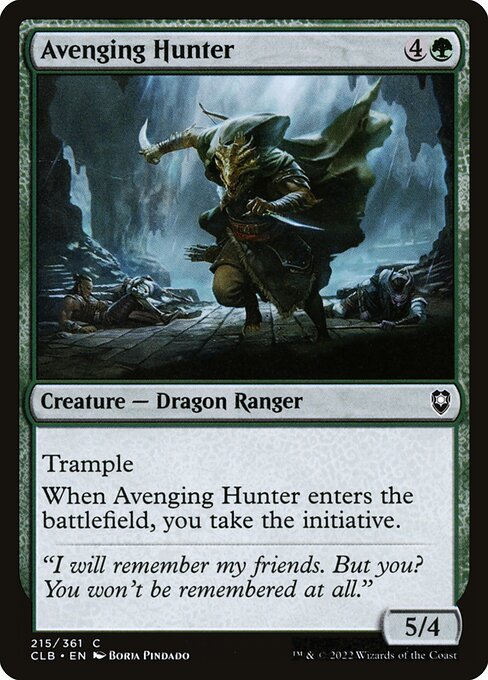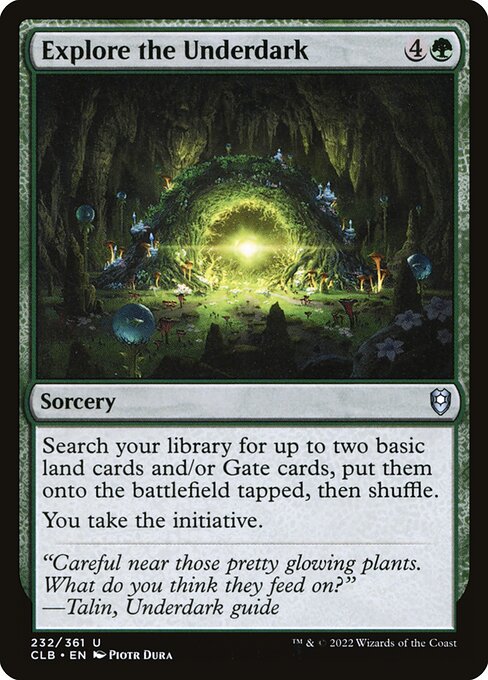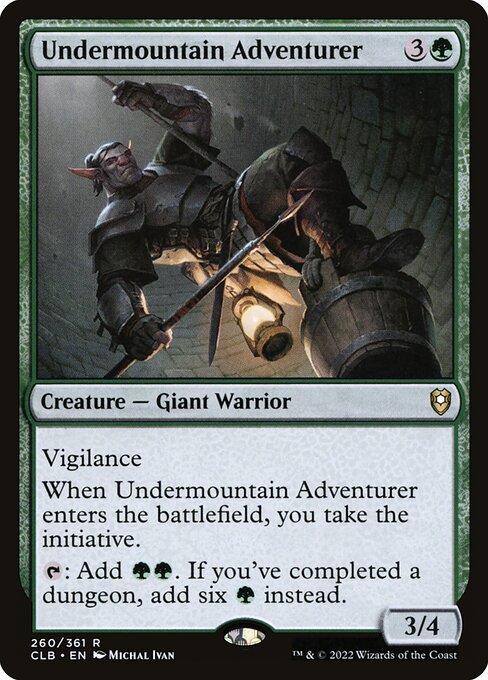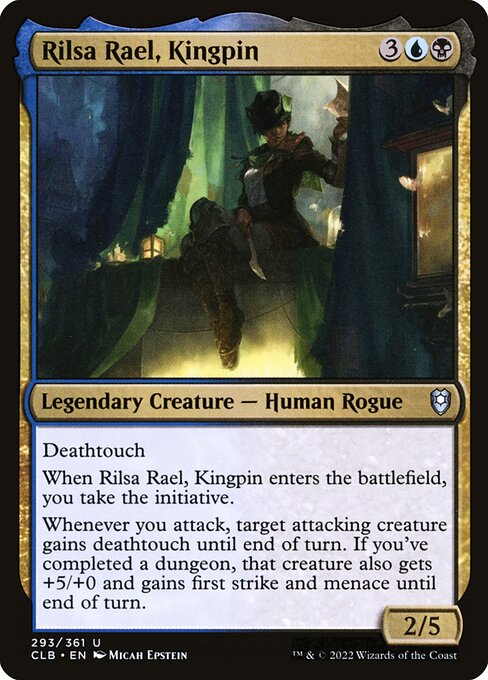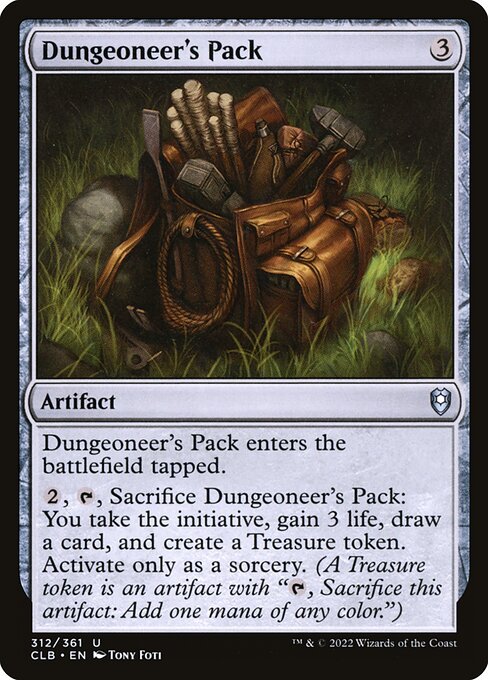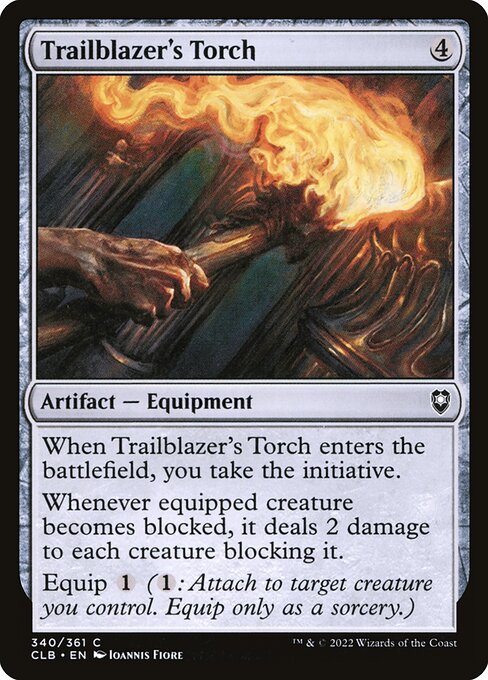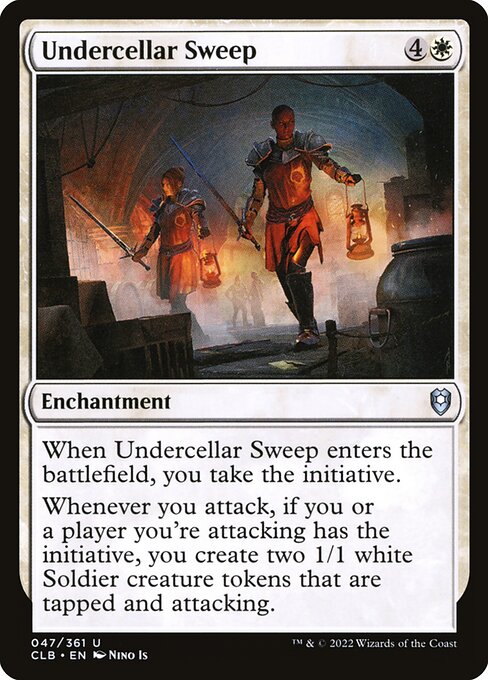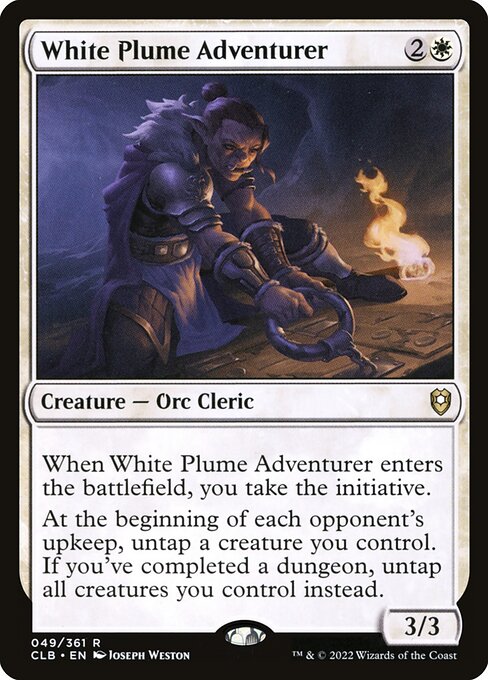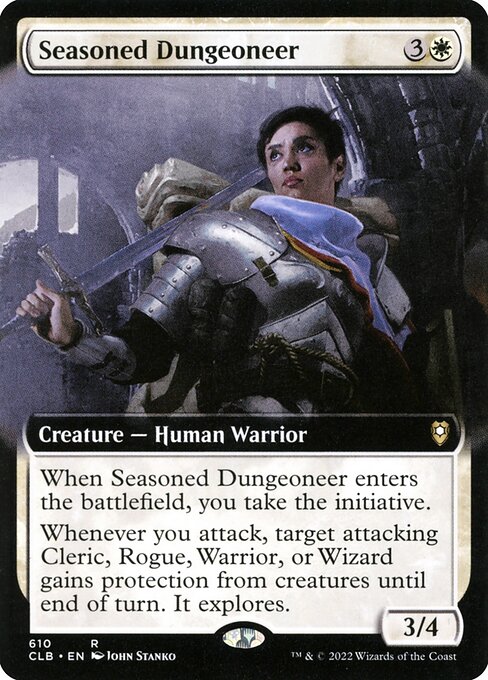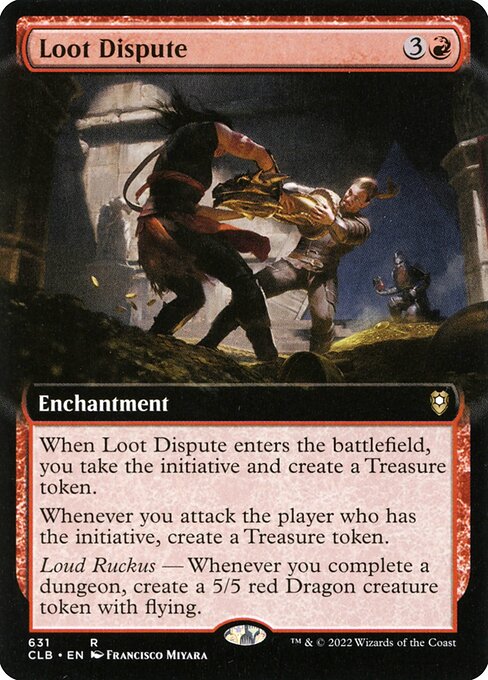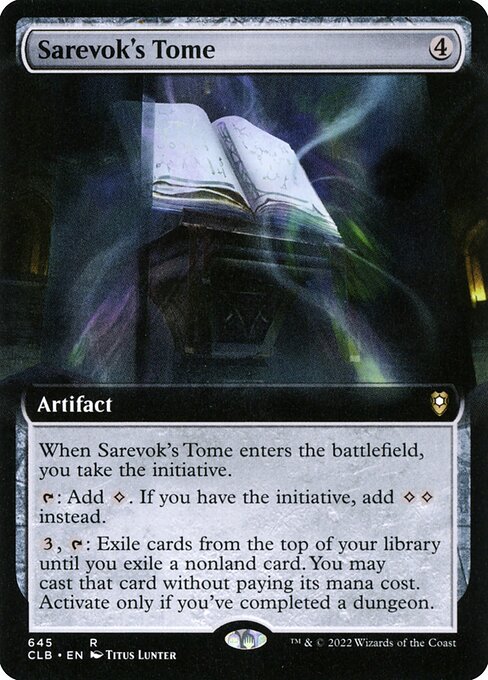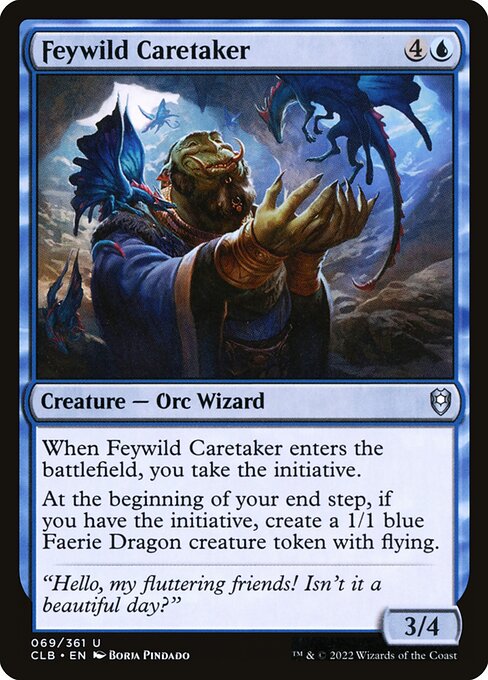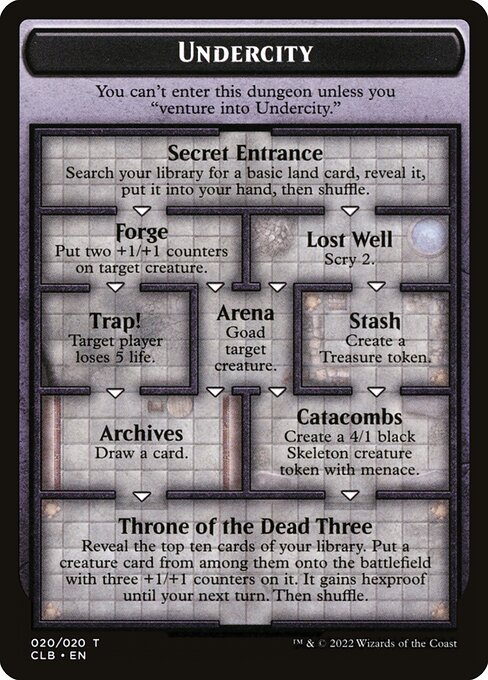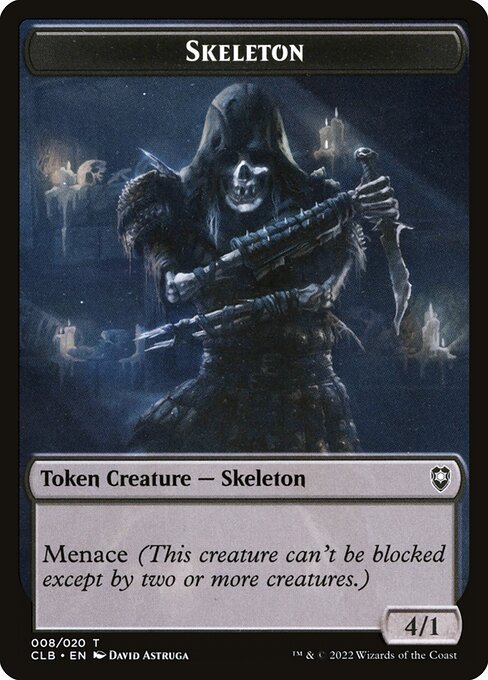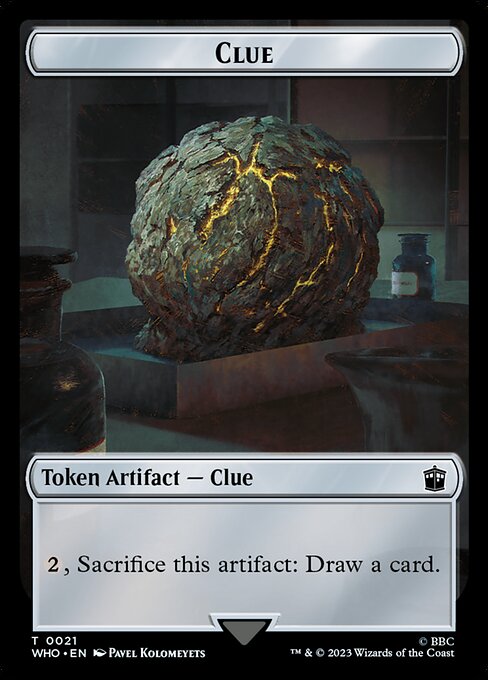From the Catacombs
Sorcery
Put target creature card from a graveyard onto the battlefield under your control with a corpse counter on it. If that creature would leave the battlefield, exile it instead of putting it anywhere else.
You take the initiative.
Escape—, Exile five other cards from your graveyard. (You may cast this card from your graveyard for its escape cost.)
You take the initiative.
Escape—, Exile five other cards from your graveyard. (You may cast this card from your graveyard for its escape cost.)
standard
future
historic
gladiator
pioneer
explorer
modern
legacy
pauper
vintage
penny
commander
brawl
alchemy
paupercommander
duel
oldschool
premodern
Rulings
Only one player can have the initiative at a time. As one player takes the initiative, any other player that had the initiative ceases to have it.
If a card has multiple abilities giving you permission to cast it, such as two escape abilities or an escape ability and a flashback ability, you choose which one to apply. The others have no effect.
There is no initiative in a game until an effect instructs a player to take the initiative. Once a player is instructed to do this, they have the initiative until another player takes the initiative.
A player who currently has the initiative may take the initiative again. This causes that player to venture into Undercity again, but does not cause them to have multiple initiative designations.
Escape's permission doesn't change when you may cast the spell from your graveyard.
The initiative is a designation a player can have. A player with the initiative designation is said to “have the initiative.” The initiative carries two inherent rules. First, whenever a player takes the initiative, and at the beginning of the upkeep of the player with the initiative, that player ventures into Undercity. Second, whenever one or more creatures a player controls deal combat damage to the player who has the initiative, the first player takes the initiative. Also, some abilities will refer to having the initiative and provide other benefits.
The corpse counter is only to help remind you which creatures will be exiled if they would leave the battlefield. If you somehow remove a corpse counter from a creature that was put onto the battlefield this way, the replacement effect that will exile it continues to apply. Similarly, moving the corpse counter onto another creature has no effect on that creature; the replacement effect will continue to apply to the original creature.
After From the Catacombs resolves, it returns to your graveyard. From there, you can use the escape ability to cast it again. Of course, you'll need five more cards to exile.
Once you begin casting a spell with escape, it immediately moves to the stack. Players can't take any other actions until you're done casting the spell.
Similarly, when instructed to venture into Undercity, you can’t start a dungeon that isn’t Undercity.
To determine the total cost of a spell, start with the mana cost or alternative cost you're paying (such as an escape cost), add any cost increases, then apply any cost reductions. The mana value of the spell remains unchanged, no matter what the total cost to cast it was and no matter whether an alternative cost was paid.
If you cast a spell with its escape permission, you can't choose to apply any other alternative costs or to cast it without paying its mana cost. If it has any additional costs, you must pay those.
If a card with escape is put into your graveyard during your turn, you'll be able to cast it right away if it's legal to do so, before an opponent can take any actions.
You cannot venture into Undercity unless instructed to do so, either because you have the initiative at the beginning of your upkeep or because you take the initiative. Notably, if you aren’t in a dungeon and an effect instructs you to venture into the dungeon (not venture into Undercity), you can’t start Undercity.
If the player with the initiative leaves the game, the active player takes the initiative at the same time that player leaves the game. If the active player is leaving the game or if there is no active player, the next player in turn order takes the initiative.
If you aren’t in a dungeon when instructed to venture into Undercity, you will put Undercity into the command zone and move your venture marker to Secret Entrance (the first room).
If you’re already in a dungeon when instructed to venture into Undercity, you move to the next room of that dungeon. If you are already in the last room, you will complete that dungeon and start Undercity. This is true whether you’re already in Undercity or any other dungeon.
In a Two-Headed Giant game, if both players on a team deal combat damage to the player that has the initiative at the same time, the player with the initiative will choose the order of the triggered abilities. Then, as those abilities resolve, one team member takes the initiative (and ventures into Undercity) and then the other team member does the same. The last player to take the initiative keeps it until the initiative changes again.
If a card has multiple abilities giving you permission to cast it, such as two escape abilities or an escape ability and a flashback ability, you choose which one to apply. The others have no effect.
There is no initiative in a game until an effect instructs a player to take the initiative. Once a player is instructed to do this, they have the initiative until another player takes the initiative.
A player who currently has the initiative may take the initiative again. This causes that player to venture into Undercity again, but does not cause them to have multiple initiative designations.
Escape's permission doesn't change when you may cast the spell from your graveyard.
The initiative is a designation a player can have. A player with the initiative designation is said to “have the initiative.” The initiative carries two inherent rules. First, whenever a player takes the initiative, and at the beginning of the upkeep of the player with the initiative, that player ventures into Undercity. Second, whenever one or more creatures a player controls deal combat damage to the player who has the initiative, the first player takes the initiative. Also, some abilities will refer to having the initiative and provide other benefits.
The corpse counter is only to help remind you which creatures will be exiled if they would leave the battlefield. If you somehow remove a corpse counter from a creature that was put onto the battlefield this way, the replacement effect that will exile it continues to apply. Similarly, moving the corpse counter onto another creature has no effect on that creature; the replacement effect will continue to apply to the original creature.
After From the Catacombs resolves, it returns to your graveyard. From there, you can use the escape ability to cast it again. Of course, you'll need five more cards to exile.
Once you begin casting a spell with escape, it immediately moves to the stack. Players can't take any other actions until you're done casting the spell.
Similarly, when instructed to venture into Undercity, you can’t start a dungeon that isn’t Undercity.
To determine the total cost of a spell, start with the mana cost or alternative cost you're paying (such as an escape cost), add any cost increases, then apply any cost reductions. The mana value of the spell remains unchanged, no matter what the total cost to cast it was and no matter whether an alternative cost was paid.
If you cast a spell with its escape permission, you can't choose to apply any other alternative costs or to cast it without paying its mana cost. If it has any additional costs, you must pay those.
If a card with escape is put into your graveyard during your turn, you'll be able to cast it right away if it's legal to do so, before an opponent can take any actions.
You cannot venture into Undercity unless instructed to do so, either because you have the initiative at the beginning of your upkeep or because you take the initiative. Notably, if you aren’t in a dungeon and an effect instructs you to venture into the dungeon (not venture into Undercity), you can’t start Undercity.
If the player with the initiative leaves the game, the active player takes the initiative at the same time that player leaves the game. If the active player is leaving the game or if there is no active player, the next player in turn order takes the initiative.
If you aren’t in a dungeon when instructed to venture into Undercity, you will put Undercity into the command zone and move your venture marker to Secret Entrance (the first room).
If you’re already in a dungeon when instructed to venture into Undercity, you move to the next room of that dungeon. If you are already in the last room, you will complete that dungeon and start Undercity. This is true whether you’re already in Undercity or any other dungeon.
In a Two-Headed Giant game, if both players on a team deal combat damage to the player that has the initiative at the same time, the player with the initiative will choose the order of the triggered abilities. Then, as those abilities resolve, one team member takes the initiative (and ventures into Undercity) and then the other team member does the same. The last player to take the initiative keeps it until the initiative changes again.
Rulings
Only one player can have the initiative at a time. As one player takes the initiative, any other player that had the initiative ceases to have it.
If a card has multiple abilities giving you permission to cast it, such as two escape abilities or an escape ability and a flashback ability, you choose which one to apply. The others have no effect.
There is no initiative in a game until an effect instructs a player to take the initiative. Once a player is instructed to do this, they have the initiative until another player takes the initiative.
A player who currently has the initiative may take the initiative again. This causes that player to venture into Undercity again, but does not cause them to have multiple initiative designations.
Escape's permission doesn't change when you may cast the spell from your graveyard.
The initiative is a designation a player can have. A player with the initiative designation is said to “have the initiative.” The initiative carries two inherent rules. First, whenever a player takes the initiative, and at the beginning of the upkeep of the player with the initiative, that player ventures into Undercity. Second, whenever one or more creatures a player controls deal combat damage to the player who has the initiative, the first player takes the initiative. Also, some abilities will refer to having the initiative and provide other benefits.
The corpse counter is only to help remind you which creatures will be exiled if they would leave the battlefield. If you somehow remove a corpse counter from a creature that was put onto the battlefield this way, the replacement effect that will exile it continues to apply. Similarly, moving the corpse counter onto another creature has no effect on that creature; the replacement effect will continue to apply to the original creature.
After From the Catacombs resolves, it returns to your graveyard. From there, you can use the escape ability to cast it again. Of course, you'll need five more cards to exile.
Once you begin casting a spell with escape, it immediately moves to the stack. Players can't take any other actions until you're done casting the spell.
Similarly, when instructed to venture into Undercity, you can’t start a dungeon that isn’t Undercity.
To determine the total cost of a spell, start with the mana cost or alternative cost you're paying (such as an escape cost), add any cost increases, then apply any cost reductions. The mana value of the spell remains unchanged, no matter what the total cost to cast it was and no matter whether an alternative cost was paid.
If you cast a spell with its escape permission, you can't choose to apply any other alternative costs or to cast it without paying its mana cost. If it has any additional costs, you must pay those.
If a card with escape is put into your graveyard during your turn, you'll be able to cast it right away if it's legal to do so, before an opponent can take any actions.
You cannot venture into Undercity unless instructed to do so, either because you have the initiative at the beginning of your upkeep or because you take the initiative. Notably, if you aren’t in a dungeon and an effect instructs you to venture into the dungeon (not venture into Undercity), you can’t start Undercity.
If the player with the initiative leaves the game, the active player takes the initiative at the same time that player leaves the game. If the active player is leaving the game or if there is no active player, the next player in turn order takes the initiative.
If you aren’t in a dungeon when instructed to venture into Undercity, you will put Undercity into the command zone and move your venture marker to Secret Entrance (the first room).
If you’re already in a dungeon when instructed to venture into Undercity, you move to the next room of that dungeon. If you are already in the last room, you will complete that dungeon and start Undercity. This is true whether you’re already in Undercity or any other dungeon.
In a Two-Headed Giant game, if both players on a team deal combat damage to the player that has the initiative at the same time, the player with the initiative will choose the order of the triggered abilities. Then, as those abilities resolve, one team member takes the initiative (and ventures into Undercity) and then the other team member does the same. The last player to take the initiative keeps it until the initiative changes again.
If a card has multiple abilities giving you permission to cast it, such as two escape abilities or an escape ability and a flashback ability, you choose which one to apply. The others have no effect.
There is no initiative in a game until an effect instructs a player to take the initiative. Once a player is instructed to do this, they have the initiative until another player takes the initiative.
A player who currently has the initiative may take the initiative again. This causes that player to venture into Undercity again, but does not cause them to have multiple initiative designations.
Escape's permission doesn't change when you may cast the spell from your graveyard.
The initiative is a designation a player can have. A player with the initiative designation is said to “have the initiative.” The initiative carries two inherent rules. First, whenever a player takes the initiative, and at the beginning of the upkeep of the player with the initiative, that player ventures into Undercity. Second, whenever one or more creatures a player controls deal combat damage to the player who has the initiative, the first player takes the initiative. Also, some abilities will refer to having the initiative and provide other benefits.
The corpse counter is only to help remind you which creatures will be exiled if they would leave the battlefield. If you somehow remove a corpse counter from a creature that was put onto the battlefield this way, the replacement effect that will exile it continues to apply. Similarly, moving the corpse counter onto another creature has no effect on that creature; the replacement effect will continue to apply to the original creature.
After From the Catacombs resolves, it returns to your graveyard. From there, you can use the escape ability to cast it again. Of course, you'll need five more cards to exile.
Once you begin casting a spell with escape, it immediately moves to the stack. Players can't take any other actions until you're done casting the spell.
Similarly, when instructed to venture into Undercity, you can’t start a dungeon that isn’t Undercity.
To determine the total cost of a spell, start with the mana cost or alternative cost you're paying (such as an escape cost), add any cost increases, then apply any cost reductions. The mana value of the spell remains unchanged, no matter what the total cost to cast it was and no matter whether an alternative cost was paid.
If you cast a spell with its escape permission, you can't choose to apply any other alternative costs or to cast it without paying its mana cost. If it has any additional costs, you must pay those.
If a card with escape is put into your graveyard during your turn, you'll be able to cast it right away if it's legal to do so, before an opponent can take any actions.
You cannot venture into Undercity unless instructed to do so, either because you have the initiative at the beginning of your upkeep or because you take the initiative. Notably, if you aren’t in a dungeon and an effect instructs you to venture into the dungeon (not venture into Undercity), you can’t start Undercity.
If the player with the initiative leaves the game, the active player takes the initiative at the same time that player leaves the game. If the active player is leaving the game or if there is no active player, the next player in turn order takes the initiative.
If you aren’t in a dungeon when instructed to venture into Undercity, you will put Undercity into the command zone and move your venture marker to Secret Entrance (the first room).
If you’re already in a dungeon when instructed to venture into Undercity, you move to the next room of that dungeon. If you are already in the last room, you will complete that dungeon and start Undercity. This is true whether you’re already in Undercity or any other dungeon.
In a Two-Headed Giant game, if both players on a team deal combat damage to the player that has the initiative at the same time, the player with the initiative will choose the order of the triggered abilities. Then, as those abilities resolve, one team member takes the initiative (and ventures into Undercity) and then the other team member does the same. The last player to take the initiative keeps it until the initiative changes again.
Your collection? Your decks?
Want to manage your collection and/or create decks?
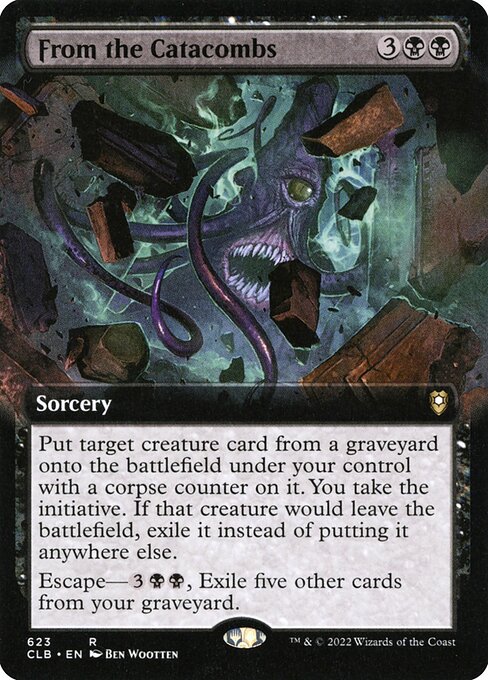

 0
0
 0.98€
0.98€
